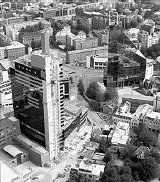Skyscrapes
The key problem of the past decade has been
how to signify us culturally and consequently assert ourselves
as a nation state, at the same time securing and demonstrating
our essential position in the Western cultural scene. Analogous
tendency is probably common to all the Eastern European
and the Baltic States after the fall of the "iron curtain".
 The
most powerful visualisation of this trend in Estonia is
the change in urban space and the formation of new architectural
environment. Rapid and partly chaotic development of Tallinn
city centre is an interesting cultural phenomenon. The new
successful generation of the 1990s needed scale and splendour
to demonstrate its status. Economic growth and prosperity
brought along something unprecedented in the urban context.
High buildings from glass and shiny metal have risen in
the central part of Tallinn during few years, creating the
new image of rapidly developing city. The first generation
capitalist dreams about skyscrapers is equally understood
symbol and the new buildings use this language maybe even
too unpretentiously, as some nationalists think. At the
same time these buildings serve the interests of the success-story
of Estonian state and nation and promoting it to the rest
of the world. The
most powerful visualisation of this trend in Estonia is
the change in urban space and the formation of new architectural
environment. Rapid and partly chaotic development of Tallinn
city centre is an interesting cultural phenomenon. The new
successful generation of the 1990s needed scale and splendour
to demonstrate its status. Economic growth and prosperity
brought along something unprecedented in the urban context.
High buildings from glass and shiny metal have risen in
the central part of Tallinn during few years, creating the
new image of rapidly developing city. The first generation
capitalist dreams about skyscrapers is equally understood
symbol and the new buildings use this language maybe even
too unpretentiously, as some nationalists think. At the
same time these buildings serve the interests of the success-story
of Estonian state and nation and promoting it to the rest
of the world.
For the citizens this progress means a whole
new urban experience, which is characterised by the synthesis
of historic and modern architecture. The urban situation
that has been forming during these few years foresees in
addition to existing high buildings in the former industrial
and living quarter the erection of several more. Such a
concentration of buildings doesn't really harm the historical
atmosphere because it hasn't been preserved in its entirety
but adds an interesting cluster of high-rise buildings to
the city skyline and on the street level communicates with
some small lovely wooden and beautiful art nouveau houses.
The direction of this progress has been somewhat occasional
but the new architectural environment creates new variations
and perspectives.
|